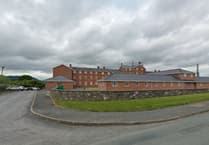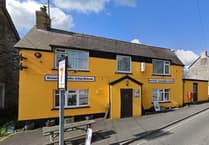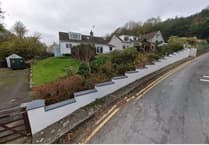Work to demolish Aberaeron’s former hospital to make way for an apartment complex has begun after attempts to call-in the plan’s approval to Welsh Government inspectors failed.
The plan to demolish the hospital building on Princes Avenue - which closed in 2019 with services moved to the Aberaeron Integrated Care Centre - and replace it with two, three-storey buildings with 20 one-bedroom flats and car parking to the rear was described as “bad planning” by Aberaeron county councillor Elizabeth Evans, who said that she failed in an attempt to get inspectors to reconsider the Ceredigion council decision to allow the scheme to go ahead.
Cllr Evans, who said the historic building will end up as “nothing more than a hostel” after permission to demolish it and make way for 20 social housing flats was narrowly approved by one vote at a meeting in March, said she had asked Cadw to give the building listed status “long before this became a formal planning application”, in a bid to protect it.
The building is in the town’s conservation area but the building itself is not listed although its historical importance is linked to its design by George Wilkinson in 1839.
It was built as a workhouse for Aberaeron Union, the first union in Cardiganshire to open a workhouse, before it was converted in 1914 to serve as a hospital for injured soldiers during World War One before becoming a cottage hospital for the town in 1930.
Heritage group Save Britain’s Heritage said it “strongly objected” to the plans for the building, saying its demolition was is “unjustified and will cause substantial harm to the unique character of this historic town.”
Little of the original use is retained and the building has been extended over the years, but as demolition work got underway last week, Cllr Evans said the building should have been retained as it was “of significant importance to the history of Ceredigion.”
“I used the ‘call-in’ process to the Welsh Government planning inspectorate, but it was not deemed to have had an impact on national planning policy,” Cllr Evans said.
“I disagree. It is a dreadful loss.
“I will always ask myself why certain buildings in the town were not listed before they were adapted for modern use.”
Nine objections to the plan by Wales and West Housing were received by the council during the planning stage, with concerns including the size of the development which would “dwarf other buildings”, the need for one-bedroom accommodation, over development, and design, with it called a “Georgian pastiche”.
The planning committee earlier this year heard that the site had been bought with a Welsh Government grant to provide one-bedroom accommodation.
The plan was narrowly approved with the casting vote from vice-chairman Cllr Bryan Davies – with nine votes against and nine votes for, with one abstention.




